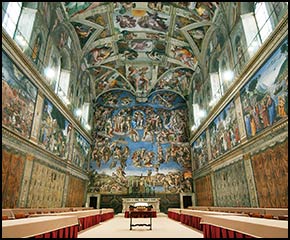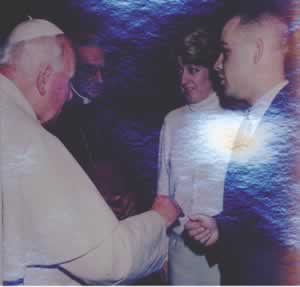Andrew Stuttaford, National Review Online's resident skeptic, is often priggish about other people being priggish. To him, any call to rein in one's personal behavior brings us closer to the Fourth Reich, and any expression of religious belief is dangerous to his ideal world of fuzzy gray agnosticism.
I wrote about Stuttaford last year, and so I won't repeat my criticisms. However, when he says something that is demonstrably false to support his worldview, it's worth refuting. Here is his post on NRO's The Corner, praising an atheist's essay about the Church of England:
The London Spectator does not, incredibly, allow access to its web site these days even to subscribers (like me) of its print edition unless they pay an extra charge, and that’s a shame because it means that Matthew Parris’ brilliant – and curiously moving - article on the Church of England won’t get the readership it deserves.
It’s never easy to explain the traditional English attitude to religion (which used to find many an echo over here too) to those outside Albion, but Parris (an atheist, as it happens) does as well as I’ve ever seen:
”The Established Church…understood in her bones two great truths: the English are wary about religion; but the English do not want to be atheists. To the English mind, atheism itself carries an unpleasant whiff of enthusiasm. To the English mind, the universe is a very mysterious thing and should be allowed to remain so. And so the English church became what up to our own day it has always remained: a God-fearing receptacle for intelligent doubt; the marrying of a quietist belief in order, duty, decency and the evident difference between right and wrong with a shrewd suspicion that anyone who thinks he can be sure of more than that is probably dangerous…That right at the center of [English] national life, should for so long have stood this great and lovely edifice of sort-of religion, adorned (through her buildings, her rituals, her art and her music) with so much beauty, so much grace and so much balm for troubled spirits, and served in her priesthood by so many luminously decent men, has surely for centuries helped confound atheism on the one hand, and serious religious enthusiasm on the other. Not so much religious belief as religious relief, this has calmed everybody down. “You really don’t need to decide,” has been Anglicanism’s refrain, “and besides, who knows?”
Amen
This is ahistorical nonsense, a falsehood wrapped in willfull ignorance and tied up with a bow of anti-religious poppycock. Of course the English people don't want to be atheists; no people on Earth have managed to be thoroughly atheistic, including the Russians, who gave it the old Slavic try for decades, murdering millions of people in the name of state supremacy over God's law. Even the French aren't that foolish.
As for the essayist's first point, I am intrigued to know how he manages to refute the entire history of his nation until the twentieth century. I am no expert on England, but I did take two semesters of British history, and (like most Americans) I know more about English religious history than any other country, as it is so bound up with our own past. There are so many counter-examples that one could write for hours about it.
Chaucer seemed to think that England was a religious nation; indeed, he thought it was so obvious that he never bothered to comment on it. Read the "Canterbury Tales" and see a nation permeated from top to bottom with explicitly religious ideas, where monks, priests, and nuns were a part of the everyday landscape.
Saint Sir Thomas More was not beheaded in 1534 for refusing to knuckle under to a "sort-of religion."
Shakespeare's England was roiling with religious controversies. Queen Elizabeth's government carried out an ongoing campaign to exterminate Catholicism within her realm, which was stoutly resisted by many of her subjects, particularly in the north. The Church of England may have said many things at that time, but "You really don’t need to decide...and besides, who knows?" was not one of them. It was, "Worship in our churches or be suspected of sedition and get fined, possibly get arrested, and if we figure out you are a Papist you could have your innards boiled in front of you as you shriek in pain and your family watches you die. Then we'll confiscate your lands and possessions and your family can wander in the street, penniless and starving."
There was a general decline in religious observance, during the Enlightenment of the eighteenth century. Thanks to the superhuman efforts of the evangelicals, most especially the Wesleys — themselves Anglicans, though their followers became known as the Methodists — the nineteenth century was a time of religious revival. By the time of the Oxford Movement, when John Henry Newman leveled charges of laxity against the Anglican communion, his critics did not say that "the universe is a very mysterious thing and should be allowed to remain so." They said he was wrong, and the Church of England was a bastion of Christendom.
It may well be true that the English people have settled in for a European-style agnostic fatalism (i.e., an embrace of the Culture of Death). I've been to England a few times, but I don't want to generalize from my experiences, and perhaps Stuttaford and Parris are right. If that is true, then that attitude is a very recent vintage, and one way or another it will disappear: either because the English rediscover their roots, or because they will disappear like the other Europeans by aborting and contracepting themselves out of existence. Either way, secularist agnosticism is a dead-end, and cannot last.

 British film student Leo Earle takes St. Simeon as his inspiration for some
British film student Leo Earle takes St. Simeon as his inspiration for some 
 We here at Catholic Light are just as grateful as can be for the election of Pope Benedict XVI, and so are most of our readers.
We here at Catholic Light are just as grateful as can be for the election of Pope Benedict XVI, and so are most of our readers. 




